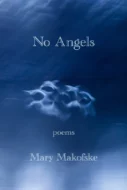 No Angels
No Angels
Mary Makofske
Kelsay Books
Reviewer: Ann Wehrman
With her latest collection, No Angels, Mary Makofske balances precise, tactile observation with a sense of dignified and compassionate distance, also posing universal questions. Her lyrical and narrative writing contrasts richly detailed texture with accessible transparency. Makofske has created poetry that shimmers with depth, clarity, multiple viewpoints, nuance, and shades of meaning.
The collection is organized into three untitled sections. Section I begins with “The Poems Are Vanishing,” in which Makofske describes various animal extinctions. The title chides humans, including poets, for our callousness as precious, primal species melt away:
… We float
face down in warmer bays,
breathe through a narrow tube,
and hope for a flash of fin,
one pulsing anemone to calm
the racing of our hearts.
Makofske writes of the death of known species, not a new process, but humans are startled to see it happen through a 21st-century digitally enhanced lens. Through long cycles of time, life on Earth changes constantly; reading “The Poems Are Vanishing,” one considers the inevitable changes humanity will make over many thousands of years, perhaps becoming extinct or evolving into a new form.
Will humans still live and love passionately when our species changes to that extent? Although extreme human evolution might be positive and even glorious, what will be lost? The poem mourns the loss of all precious species, and after reading, one feels the importance of living fully now, of speaking one’s messy, imperfect truth. In the face of inevitable evolution, let us embrace life; as Dylan Thomas cries in “Do Not Go Gentle into That Good Night,” let us “rage, rage against the dying of the light.”
Section I also contains two longer narrative poems set more than one hundred years apart: the tragic anti-slavery poem, “Matilda Lawrence,” set before the Civil War, and the title poem, “No Angels,” which explores the 2014 fatal shooting of a Black man, Michael Brown, by officer Darren Wilson, in Ferguson, Missouri. In both poems, Makofske probes for understanding beyond racism, that cancer we downplay and ignore at our peril, as individuals, as a nation, and as a world.
Makofske continues to muse on loss and extinction, in “Lost Languages”:
How many buried languages
sleep under the roofs
of mouths silent
except for whispers of decay?
Soon only cathedrals
of fine bones echo
with lost prayers,
flights of meaning
now with nowhere
in the world to perch.
Crumbling temples of Angkor Wat, Egypt’s pyramids pointing to the stars, and holy places built with faith, prayers, and daily speech in vanished tongues ring the world. Are those prayers lost once they have been uttered, or is decay natural, with rebirth and change feeding the future? Can the future be auspicious if the past is lost? Perhaps memories will remain with humanity as long as it takes us to heal the pain we have inflicted on each other, on all life, and ourselves.
In “The Olives,” Makofske writes,
Almost beyond hope, this ache for a place
in the world. Neither homesickness nor
nostalgia. Perhaps hireath, a Welch word:
Yearning for home to which one cannot
return. Or a home that never was, a past
that is chimera. What language do olives
speak, with roots in the past, leaves
whispering untranslatable secrets?
Their bitterness, their endurance,
their burning, their promise of peace.
Makofske’s powerful invocation for peace is a prayer sung to the wind, as the unconscionable conflict in the Holy Land continues, blind to the kinship of all humanity.
In Section II, Makofske’s focus moves from universal and world events to touch on personal relationships and the ineffable beauty of nature. “Feast” brims with tenderness for a cherished son:
I pour milk into your long bones
and their knobs, sprockets, levers
strain against your skin,
ache in your calves and knees,
your flesh drawn so tightly
on your ribs it surely hurts.
You’re blind to what this agony
begins by fits and starts to show:
broad shoulders and lean back,
the tapered hips; under your troubled
skin and pout, a narrow face, a mouth
women will notice. I keep it secret,
like a family recipe. Your raw
ingredients, this chaos
that precedes a feast.
Makofske’s writing in this section is particularly descriptive; poems feature extensive, wildly generous imagery, such as that in “May Morning, Luminous,” which begins, “The dew like mica / in the grass, sky neon blue, / the moon a chalky thumbprint.” In “Lens to Magnify,” the poet confesses:
I study it all
with a jeweler’s eye
for each wink of color
except when snow strips
the world to a blank canvas
or morning opens
encased in crystal.
Section III returns the reader with a thud to the crisis humans have created and continue to create through abuse, violence, and war. In “Doldrums Near the End of Empire,” Makofske writes,
Better, perhaps, to sit in this autumn sunlight,
warm as summer thanks to our cozy blanket of carbon,
than read another analysis of debates that simmer
with heat, not light, as the campaigns sputter and cough
while we stand hopeless on the sidelines,
knowing no candidate can take us to the land
we remember, with what may be tarnished memory,
or to the one we’ve never quite reached, far off in the fog.
Makofske ends with a question, in “This One Life”:
This one life you have
how will you spend it
finger locked on the trigger
a mouth full of nettles
your child a burden to carry
her cry a hook in your flesh
. . .
will you spend it on a nightmare
or even a dream
or will you lower your weapons
to see the web tremble
close your eyes
and let the blind wind read you
The poet’s conscience and love ring through this collection: a walk through darkness and bright, glorious light; and an exhortation to readers to see, feel, and choose well, as we and the world inevitably change.

